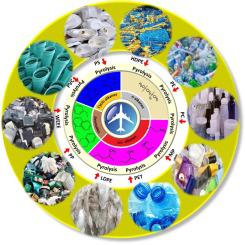Energy Conversion and Management ( IF 10.4 ) Pub Date : 2022-11-12 , DOI: 10.1016/j.enconman.2022.116433 Ijaz Hussain , Saheed A Ganiyu , Hassan Alasiri , Khalid Alhooshani

|
In recent years, there has been an increase in the amount of attention paid in published scientific works to the problems that waste plastics, and the associated issues cause in the land and marine ecosystems. Pyrolysis is a promising method for converting waste polymers into useful products such as aviation fuel oil, and the scientific and business communities have been attempting to commercialize it. Much work has been put into the research and development of efficient catalytic pyrolysis systems. There is, however, a significant gap in writing a cutting-edge review on the catalytic pyrolysis of waste plastics to produce aviation fuel oil using the PRISMA technique. The objective of this study is to examine the up-to-date scientific and technological breakthroughs associated with the existing aviation fuel production paths and to identify those that may eventually lead to the construction of a sustainable supply chain fuel. This study focuses on the catalytic pyrolysis of waste plastics to enhance aviation fuel oil production, the factors that affect the enhanced pyrolysis activity, such as process conditions, catalyst, kinetics, and mechanistic insights, as well as the technological feasibility analysis of waste plastic pyrolysis and the proposed setup for commercialization of catalytic plastic pyrolysis. It was discovered that catalytic pyrolysis, temperature, and reactor type could be used to simulate an adequate reactor model to attain the highest possible jet fuel efficiency with zeolites, activated carbon, clays, Fluid Catalytic Cracking (FCC), and metal-based catalysts. It can be concluded that the alterations of reaction conditions significantly impact the overall selectivity and composition of aviation fuel. The production of aviation fuel is essential for attaining technological and economic objectives, and the current research offers numerous effective ways to transform waste plastics straight into transportation jet fuel.
中文翻译:

废塑料衍生航空燃料的最新综述:揭示催化热解的非均相催化系统和技术经济可行性
近年来,已发表的科学著作越来越多地关注废塑料问题及其在陆地和海洋生态系统中引起的相关问题。热解是将废聚合物转化为有用产品(如航空燃料油)的一种很有前景的方法,科学界和商业界一直在尝试将其商业化。在高效催化热解系统的研究和开发方面已经投入了大量工作。然而,在撰写一篇关于使用 PRISMA 技术催化热解废塑料生产航空燃料油的前沿评论方面存在很大差距。本研究的目的是检查与现有航空燃料生产路径相关的最新科技突破,并确定最终可能导致构建可持续供应链燃料的那些突破。本研究的重点是废塑料催化热解以提高航空燃料油产量,影响增强热解活性的因素,如工艺条件、催化剂、动力学和机理见解,以及废塑料热解的技术可行性分析以及催化塑料热解商业化的建议设置。发现催化热解、温度和反应器类型可用于模拟适当的反应器模型,以使用沸石获得尽可能高的喷气燃料效率,活性炭、粘土、流化催化裂化 (FCC) 和金属基催化剂。可以得出结论,反应条件的改变显着影响航空燃料的整体选择性和组成。航空燃料的生产对于实现技术和经济目标至关重要,目前的研究提供了许多将废塑料直接转化为运输喷气燃料的有效方法。



























 京公网安备 11010802027423号
京公网安备 11010802027423号